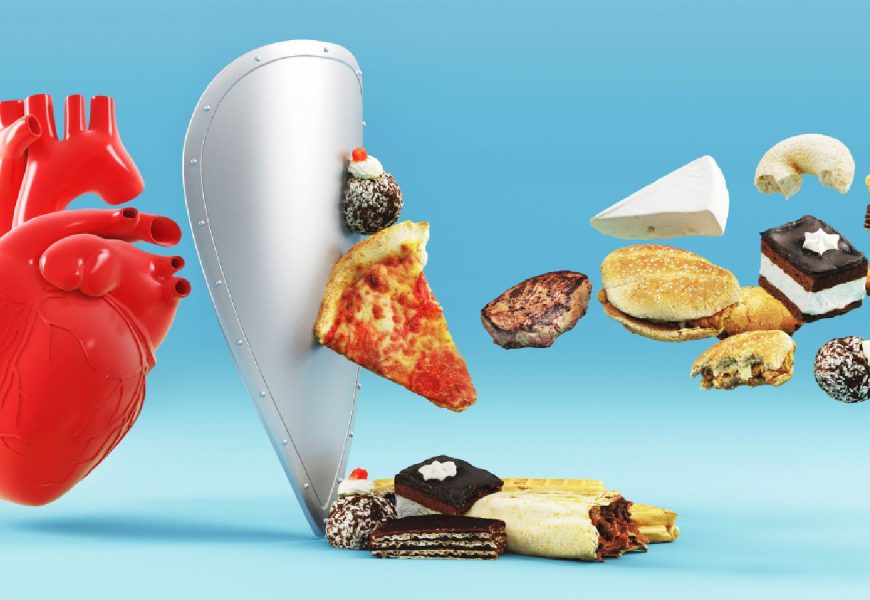Your heart is one of the most vital organs in your body, and what you eat plays a significant role in keeping it healthy. While some foods nourish and strengthen the heart, others can increase the risk of high blood pressure, cholesterol buildup, and heart disease. Many people unknowingly consume foods that harm their cardiovascular health, leading to long-term problems. To protect your heart, it’s important to be mindful of what you put on your plate. Below are some of the most harmful foods you should avoid for a stronger and healthier heart.
1. Processed and Packaged Foods
Highly processed foods, such as chips, instant noodles, frozen meals, and packaged snacks, often contain excessive sodium, unhealthy fats, and artificial preservatives that can harm your heart. These foods are designed to last longer on shelves, but their ingredients can negatively impact your health. High sodium levels can raise blood pressure, forcing your heart to work harder, while trans fats and preservatives contribute to inflammation and plaque buildup in the arteries. To maintain a healthy heart, it is best to minimize your intake of processed foods and opt for fresh, whole foods instead.
2. Sugary Beverages (Soda, Energy Drinks, and Sweetened Juices)
Sugary drinks, such as sodas, flavored juices, and energy drinks, are among the biggest contributors to obesity and heart-related issues. These beverages contain large amounts of added sugar, which leads to insulin resistance and increased fat storage in the body. Over time, excessive sugar consumption can contribute to high blood pressure, type 2 diabetes, and an increased risk of heart disease. Instead of sugary drinks, try drinking water, herbal teas, or freshly squeezed juices without added sugar to keep your heart in good shape.
3. Deep-Fried and Fast Foods
Foods that are deep-fried, such as French fries, fried chicken, and onion rings, are loaded with unhealthy fats and empty calories. The trans fats and saturated fats present in these foods contribute to bad cholesterol (LDL) levels while lowering good cholesterol (HDL). Regular consumption of fried foods can lead to inflammation, weight gain, and a higher risk of heart disease. To make healthier choices, try baking, grilling, or air-frying your food instead of deep-frying. These methods allow you to enjoy delicious meals without the harmful effects of excess oil.
4. Processed Meats (Sausages, Hot Dogs, and Deli Meats)
Processed meats, including sausages, hot dogs, and deli slices, contain high levels of sodium, preservatives, and unhealthy fats. The sodium content in these meats can elevate blood pressure, increasing the strain on your heart. Additionally, the preservatives used in these products, such as nitrates, have been linked to heart disease. Regular consumption of processed meats may contribute to cholesterol buildup, leading to an increased risk of heart attacks and strokes. Opting for lean protein sources, such as grilled chicken, fish, or plant-based alternatives, can help you maintain better heart health.
5. White Bread, Pasta, and Refined Carbohydrates
Refined carbohydrates, such as white bread, pasta, and pastries, are stripped of their natural fiber and essential nutrients. As a result, they cause blood sugar levels to spike and drop quickly, leading to insulin resistance and increased fat storage. Over time, excessive consumption of refined carbs can contribute to obesity, diabetes, and heart disease. Choosing whole-grain alternatives like brown rice, whole wheat bread, and quinoa provides your body with fiber, which helps maintain stable blood sugar levels and supports heart health.
6. High-Fat Dairy Products (Full-Fat Cheese, Butter, and Cream)
Dairy products that contain high amounts of saturated fats, such as full-fat cheese, butter, and heavy cream, can contribute to high cholesterol levels. Saturated fats raise “bad” LDL cholesterol, which can accumulate in the arteries and restrict blood flow. This increases the risk of heart attacks and strokes. Additionally, some dairy products contain high sodium levels, which can elevate blood pressure. To make healthier choices, opt for low-fat dairy products, plant-based milk alternatives, or use heart-friendly options like avocado or olive oil instead of butter.
7. Excess Alcohol Consumption
While moderate alcohol intake may not pose significant risks, excessive drinking can have severe consequences for heart health. Alcohol raises blood pressure, contributes to weight gain, and weakens the heart muscle over time. Heavy alcohol consumption can also increase triglyceride levels, which may lead to artery blockages and an elevated risk of cardiovascular disease. If you drink alcohol, do so in moderation—one drink per day for women and up to two drinks per day for men. Choosing red wine in small amounts may offer some heart benefits due to its antioxidant properties, but it’s always best to consult with a healthcare professional regarding alcohol consumption.
8. Ice Cream and Other High-Sugar Desserts
Sugary desserts like ice cream, pastries, and candy bars are loaded with refined sugars and unhealthy fats, both of which contribute to heart disease. Consuming too much sugar can lead to weight gain, increased inflammation, and higher triglyceride levels. Over time, this raises the risk of heart problems, including hypertension and diabetes. Instead of high-sugar treats, consider healthier alternatives such as fruit-based desserts, dark chocolate with high cocoa content, or Greek yogurt with fresh berries. These options satisfy your sweet cravings while providing nutrients that support overall heart health.
Final Thoughts
Maintaining a heart-healthy diet is essential for long-term well-being. Processed and fried foods, sugary drinks, refined carbs, and excessive saturated fats can contribute to heart problems over time. Making small yet meaningful changes to your diet—such as opting for whole grains instead of refined carbs, choosing lean proteins over processed meats, and selecting healthy fats over trans fats—can make a significant difference. By being mindful of your food choices, you can take proactive steps to protect your heart and lead a healthier life.
Your heart works tirelessly for you every day—give it the nourishment it deserves!




